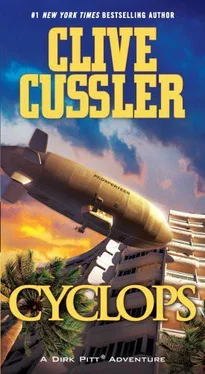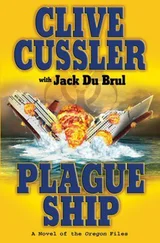Soviet President Antonov observed the liftoff from an armored glass bunker through a pair of large binoculars mounted on a tripod. Sergei Kornilov and General Yasenin stood beside him, intently monitoring voice communications between the cosmonauts and the space control center.
"An inspiring sight," Antonov muttered in awe.
"A textbook launch," Kornilov said. "They'll reach escape velocity in four minutes."
"Does all go well?"
"Yes, Comrade President. All systems are functioning normally. And they are exactly on track."
Antonov gazed at the long tongue of flame until it finally vanished. Only then did he sigh and step away from the binoculars. "Well, gentlemen, this space spectacular should take the world's eyes off the next American shuttle flight to their new orbital station."
Yasenin nodded in agreement and gripped Kornilov's shoulder. "My congratulations, Sergei. You stole the Yankee triumph for the Soviet Union."
"No brilliance on my part," said Kornilov. "Because of orbital mechanics, our lunar launch window happened to be open for an advantageous shot several hours ahead of their scheduled launch."
Antonov stared into the sky as if mesmerized. "I assume American intelligence isn't privy to the fact our cosmonauts are not what they seem."
"A flawless deception," Yasenin said without reservation. "The switch of five space scientists for specially trained soldiers shortly before liftoff went smoothly."
"I hope we can say the same about the crash program to replace test equipment with weapons," said Kornilov. "The scientists whose experiments were canceled nearly caused a riot. And the engineers, who were ordered to redesign the interior of the station to accommodate new weight factors and weapon storage requirements, became angry at not being told the reason behind the last-minute changes. Their displeasure will most certainly be leaked."
"Don't lose any sleep over it," Yasenin laughed. "The American space authorities will suspect nothing until communication with their precious moon base goes dead."
"Who is in command of our assault team?" asked Antonov.
"Major Grigory Leuchenko. An expert on guerrilla warfare. The major won many victories against the rebels in Afghanistan. I can personally vouch for his qualities as a loyal and outstanding soldier."
Antonov nodded thoughtfully. "A good choice, General. He should find the lunar surface little different from that of Afghanistan."
"There is no question that Major Leuchenko will conduct a successful operation."
"You forget the American astronauts, General," said Kornilov.
"What about them?"
"The photographs demonstrate they have weapons too. I pray they are not fanatics who will wage a strong fight to protect their facility."
Yasenin smiled indulgently. "Pray, Sergei? Pray to whom? Certainly not to any God. He won't help the Americans once Leuchenko and his men begin their attack. The outcome is a foregone conclusion. Scientists cannot stand up against professional soldiers trained to kill."
"Do not underrate them. That's all I have to say."
"Enough!" Antonov said loudly. "I'll hear no more of this defeatist talk. Major Leuchenko has the double advantage of surprise and superior weaponry. Less than sixty hours from now the first real battle for space will begin. And I do not expect the Soviet Union to lose it."
In Moscow, Vladimir Polevoi sat at his desk in the KGB center on Dzerzhinski Square, reading a report from General Velikov. He did not glance up as Lyev Maisky strode into the room and sat down without an invitation. Maisky's face was common, blank and one-dimensional like his personality. He was Polevoi's deputy head of the First Chief Directorate, the foreign operations arm of the KGB. Maisky's relations with Polevoi were restrained, but they complemented each other.
Finally, Polevoi's eyes bored through Maisky. "I'd like an explanation."
"The LeBarons' presence was unforeseen," Maisky said tersely.
"Mrs. LeBaron and her crew of treasure hunters, perhaps, but certainly not her husband. Why did Velikov take him from the Cubans?"
"The general thought Raymond LeBaron might be a useful pawn in negotiations with the U.S. State Department after the Castros were removed."
"His good intentions have made for a dangerous game," said Polevoi.
"Velikov assures me that LeBaron is kept under strict security and fed false information."
"Still, there is always a small chance LeBaron might discover the true function of Cayo Santa Maria."
"Then he would simply be erased."
"And Jessie LeBaron?"
"My personal thoughts are that she and her friends will prove useful dupes in laying the blame for our projected disaster on the CIA's doorstep."
"Has Velikov or our resident agents in Washington uncovered any plans by American intelligence to infiltrate the island?"
"Negative," Maisky answered. "A check on the blimp's crew showed none have current ties with the CIA or the military."
"I want no screw-ups," said Polevoi firmly. "We're too close to success. You pass my words on to Velikov."
"He shall be instructed."
There was a knock on the door and Polevoi's secretary entered. Without a word she handed him a paper and left the room.
Sudden anger reddened Polevoi's face. "Damn! Speak of a threat, and it becomes a reality."
"Sir?"
"A priority signal from Velikov. One of the prisoners has escaped."
Maisky made a nervous movement with his hands. "It is impossible. There are no boats on Cayo Santa Maria, and if he is foolish enough to swim, he'll either drown or be eaten by sharks. Whoever it is won't get far."
"His name is Dirk Pitt, and according to Velikov he's the most dangerous of the lot."
"Dangerous or not--"
Polevoi waved him to silence and began pacing the carpet, his face reflecting deep agitation. "We cannot afford the unexpected. The deadline for our Cuban adventure must be moved up a week."
Maisky shook his head in disagreement. "The ships would never reach Havana in time. Also, we can't change the dates of the celebration. Fidel and every high-ranking member of his government will be on hand for the speechmaking. The wheels of the explosion are set in motion. Nothing can be done to alter the timing. Rum and Cola must either be called off or continue as scheduled."
Polevoi clasped and unclasped his hands in an agony of indecision. "Rum and Cola, a stupid name for an operation of such magnitude."
"Another reason to push on. Our disinformation program has already begun spreading rumors of a CIA plot to launch devastation in Cuba. The phrase `Rum and Cola' is patently American. No foreign government would suspect it as being hatched in Moscow."
Polevoi shrugged in assent. "Very well, but I don't want to think about the consequences if this Pitt fellow by some miracle survives and makes it back to the United States."
"He is already dead," Maisky announced boldly. "I am sure of it."
<<38>>
The President leaned into Daniel Fawcett's office and waved. "Don't get up. Just wanted you to know I'm going upstairs for a quiet lunch with my wife."
"Don't forget we have a meeting with the intelligence chiefs and Doug Oates in forty-five minutes," Fawcett reminded him.
"I promise to be on time."
The President turned and took the elevator to his living quarters on the second floor of the White House. Ira Hagen was waiting for him in the Lincoln suite.
"You look tired, Ira."
Hagen smiled. "I'm behind on my sack time."
"How do we stand?"
"I've accounted for the identities of all nine members of the `inner core.' Seven are pinpointed. Only Leonard Hudson and Gunnar Eriksen remain outside the net."
"You haven't picked up their trail from the shopping center?"
Hagen hesitated. "Nothing that panned out."
Читать дальше












